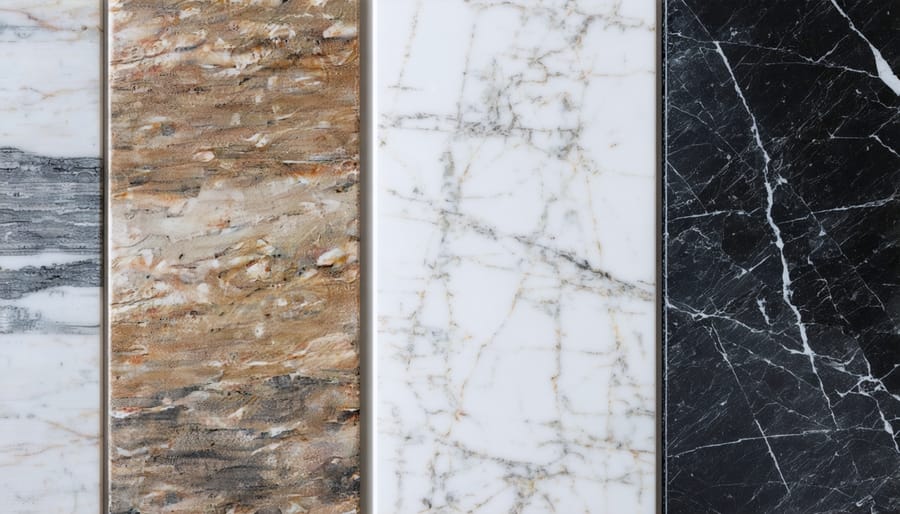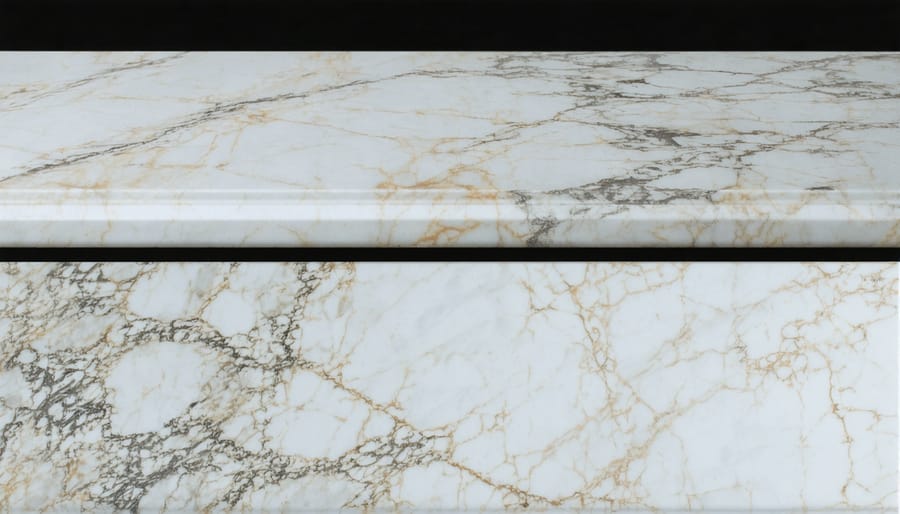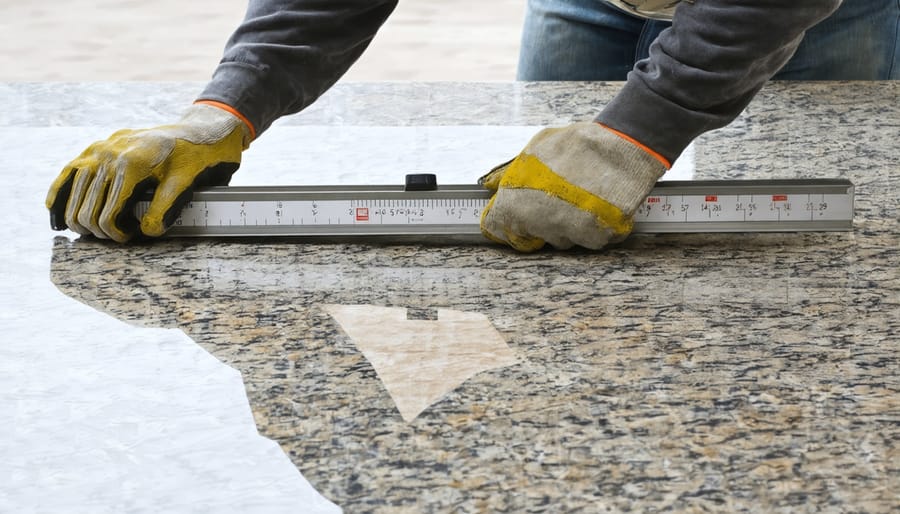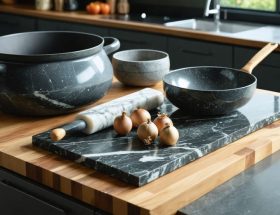Natural stone countertops transform ordinary kitchens into stunning culinary spaces, blending timeless elegance with practical functionality. From the dramatic veining of marble to the speckled depth of granite, these geological masterpieces offer unparalleled uniqueness – each slab tells its own story through millions of years of natural formation. Yet beneath their breathtaking beauty lies a complex decision that demands careful consideration of durability, maintenance requirements, and long-term value.
As investment pieces that can significantly impact both daily life and property value, natural stone countertops require thoughtful evaluation of their strengths and limitations. While they provide exceptional heat resistance and can last generations with proper care, factors like porosity, staining potential, and regular sealing needs must be weighed against their remarkable aesthetic appeal. Whether you’re renovating a kitchen, designing a new home, or simply exploring upgrade options, understanding the full spectrum of benefits and challenges will ensure you make an informed choice that aligns with your lifestyle and expectations.
This comprehensive guide examines the key advantages and disadvantages of natural stone countertops, empowering you to determine if these spectacular surfaces are the right fit for your space.
The Timeless Appeal of Natural Stone
Available Stone Options
Natural stone countertops offer a diverse range of options, each with distinct characteristics and appeal. Granite remains a popular choice, known for its durability and unique patterns. You can transform your kitchen with granite while enjoying its heat-resistant properties and scratch-resistant surface.
Marble, with its timeless elegance, features distinctive veining patterns that make each slab unique. Although softer than granite, marble’s classic beauty makes it particularly appealing for luxury installations and bathroom vanities.
Quartzite offers exceptional durability and resembles marble in appearance but provides superior resistance to etching and scratching. This natural stone is increasingly popular among homeowners seeking both beauty and practicality.
Soapstone presents a softer, more organic appearance with its matte finish and typically dark gray coloring. While softer than other options, it’s non-porous and highly resistant to heat and chemicals, making it ideal for busy kitchens. Each stone develops a unique patina over time, adding character to your space.

Visual Characteristics
Natural stone countertops offer an unmatched range of visual characteristics, with each slab telling its own geological story. Granite displays speckled patterns with crystalline structures in colors ranging from deep blacks and browns to whites and blues. Marble’s signature veining creates dramatic sweeping patterns, typically in whites and grays with contrasting streaks that can include gold, brown, or black.
Quartzite presents with a crystalline sparkle similar to granite but often features more pronounced veining patterns reminiscent of marble. Soapstone offers a softer, more subtle appearance with matte finishes in various shades of gray, sometimes displaying gentle veining patterns.
Each stone type has unique variations in color density, pattern distribution, and surface characteristics. These variations ensure that every slab is one-of-a-kind, making your countertop truly unique. Some stones also exhibit special features like fossil imprints in limestone or mica flecks in granite that catch and reflect light.
The finish choice – whether polished, honed, or leathered – can dramatically affect the stone’s appearance, altering both color intensity and pattern visibility.
Advantages of Natural Stone Countertops
Durability and Longevity
Natural stone countertops are renowned for their exceptional durability and impressive longevity, often lasting several decades with proper care. These surfaces can withstand significant daily wear and tear, making them ideal for busy kitchens where natural stone cooking benefits truly shine. Most natural stones, particularly granite and quartzite, are highly resistant to scratching and chipping, though it’s still advisable to use cutting boards to maintain their pristine appearance.
One of the most remarkable features of natural stone countertops is their heat resistance. Unlike many synthetic materials, they can typically withstand hot pots and pans without damage, though using trivets is recommended as a precautionary measure. Different stone types offer varying levels of durability – granite and quartzite rank among the most robust, while marble and limestone require more careful handling.
With proper sealing and maintenance, natural stone countertops can maintain their beauty and functionality for 50 years or more, making them a worthwhile long-term investment for any home. Their resilience against normal wear patterns and ability to be refinished if necessary contributes to their extended lifespan.
Property Value Enhancement
Natural stone countertops consistently rank among the most desirable kitchen features for homebuyers, making them a smart investment for property value enhancement. Real estate professionals regularly cite stone countertops as a key selling point that can significantly impact a home’s marketability and final selling price.
Studies show that homes with natural stone countertops typically command higher resale values compared to properties with laminate or other synthetic surfaces. The National Association of Realtors reports that homeowners can expect to recover 80-100% of their natural stone countertop investment during resale, making it one of the most value-retaining kitchen upgrades.
The timeless appeal of natural stone particularly resonates with luxury home buyers, who often view these countertops as an indicator of overall home quality. Materials like granite, marble, and quartzite are especially prized in high-end real estate markets. Even in mid-range homes, natural stone countertops can be the distinguishing feature that helps a property stand out in competitive markets and potentially sell faster.
Beyond immediate resale value, natural stone countertops offer long-term value retention due to their durability and classic aesthetic, which rarely goes out of style.
Environmental Benefits
Natural stone countertops stand out as an environmentally conscious choice for sustainable home design. Unlike manufactured materials, these countertops require minimal processing, significantly reducing their carbon footprint. The extraction and fabrication process typically consumes less energy compared to synthetic alternatives, making them a greener option for eco-conscious homeowners.
One of the most compelling environmental benefits is natural stone’s durability, which can span generations. This longevity means fewer replacements over time, reducing waste and the environmental impact of manufacturing new materials. When a stone countertop eventually reaches the end of its life, it can be repurposed or recycled, returning to the earth without harmful environmental consequences.
Natural stone is also free from synthetic chemicals and artificial compounds, making it a non-toxic choice for your home. It doesn’t emit volatile organic compounds (VOCs) or other harmful substances that can affect indoor air quality. Additionally, stone’s thermal mass properties can contribute to better temperature regulation in your kitchen, potentially reducing energy costs for heating and cooling.
Local sourcing options further enhance the environmental benefits, as many quarries operate within reasonable distances from fabrication facilities, reducing transportation-related emissions. This regional availability supports local economies while minimizing the carbon footprint associated with long-distance shipping.
Potential Drawbacks to Consider
Maintenance Requirements
Natural stone countertops require regular maintenance to preserve their beauty and durability. The most crucial maintenance task is sealing the stone, typically needed every 6-12 months depending on usage and stone type. Granite generally requires less frequent sealing than marble or limestone, but all natural stones need this protective barrier against stains and moisture.
Daily cleaning involves using a pH-neutral stone cleaner and a soft microfiber cloth. Avoid acidic cleaners, including vinegar and citrus-based products, as these can etch the stone’s surface. Clean spills immediately, especially acidic substances like wine, coffee, or citrus juices, to prevent staining and etching.
For routine care, use cutting boards to prevent scratches, and always place hot pots and pans on trivets or heat-resistant pads. While many natural stones are heat-resistant, sudden temperature changes can cause thermal shock and potentially crack the surface.
Watch for signs that indicate your countertop needs resealing, such as water droplets that no longer bead on the surface. Perform the water test by placing a few drops on the counter – if the water soaks in rather than beads up, it’s time to reseal.
Professional deep cleaning and restoration may be necessary every few years, especially for heavily used surfaces or if damage occurs. With proper maintenance, natural stone countertops can maintain their beauty and functionality for decades.
Cost Considerations
Natural stone countertops represent a significant investment in your home, with prices typically ranging from $40 to $200 per square foot installed. Granite tends to be the most budget-friendly option, starting at $40-60 per square foot, while luxury materials like rare marble can exceed $200 per square foot. The final cost depends on factors including stone type, quality grade, thickness, edge treatment, and installation complexity.
Beyond the initial purchase price, homeowners should consider long-term maintenance expenses. While durable, natural stone requires periodic sealing to maintain its protective barrier against stains and moisture. Professional sealing services cost between $200-400 annually, though DIY options are available for $25-50 per application. Additionally, budget for cleaning products specifically formulated for natural stone, which typically cost $15-30 per bottle.
Despite the higher upfront investment compared to synthetic alternatives, natural stone countertops can increase property value and typically last the lifetime of the kitchen when properly maintained. Many homeowners find the long-term value justifies the initial expense, particularly when considering the material’s durability and timeless appeal.
Potential Issues
Natural stone countertops, while beautiful and durable, can present several challenges that homeowners should consider. Staining is a primary concern, particularly with porous stones like marble and limestone. Acidic substances such as wine, citrus juices, and vinegar can leave permanent marks if not cleaned promptly. Even water can potentially leave mineral deposits on some stone surfaces.
Etching is another significant issue, especially with calcium-based stones. When acidic substances come into contact with the surface, they can create dull spots that alter the stone’s finish. This damage is particularly visible on polished surfaces and can be difficult to repair without professional intervention.
Some stones may develop cracks or fissures over time, particularly if subjected to extreme temperature changes or heavy impacts. Seams between stone slabs can also become more noticeable as the countertop settles. Additionally, certain stones may require periodic resealing to maintain their protective barrier against stains and moisture.
Regular maintenance and proper care are essential to minimize these potential issues. Using appropriate cleaning products and addressing spills immediately will help preserve the stone’s beauty and integrity.

Making the Right Choice for Your Kitchen
Lifestyle Considerations
Your lifestyle and cooking habits should play a crucial role in selecting the perfect natural stone countertop. For passionate home chefs who frequently cook, granite and quartzite are excellent choices due to their exceptional heat resistance and durability. These materials can withstand hot pots and pans while helping to enhance your kitchen’s functionality.
If you entertain often, consider how different stones react to common party scenarios. Marble, while stunning, may show etching from acidic drinks like wine or citrus, requiring more vigilant maintenance. Granite and quartzite offer better stain resistance for social gatherings, though they still benefit from periodic sealing.
For busy families, practicality often takes precedence. Soapstone’s non-porous nature makes it ideal for households with children, as it resists bacteria and doesn’t require sealing. However, it can develop a patina over time, which some view as character-building while others prefer to avoid.
Consider your cleaning preferences as well. Some homeowners enjoy the ritual of maintaining natural stone, while others prefer minimal upkeep. Granite typically requires sealing every 12-18 months, while quartzite may need less frequent attention. Marble demands more regular care to maintain its pristine appearance, particularly in high-traffic kitchen areas.

Professional Installation Importance
Professional installation of natural stone countertops is crucial for their long-term performance and appearance. While DIY projects can be tempting for cost savings, natural stone installation requires specialized knowledge, tools, and experience that only qualified professionals can provide.
A proper installation begins with accurate measurements and templating to ensure perfect fits and seams. Professional installers understand the importance of a level foundation and proper support structure, as natural stone’s weight requires adequate reinforcement to prevent cracking or sagging over time.
Seam placement and execution are particularly critical aspects that demand expertise. Skilled installers strategically position seams where they’ll be least noticeable and use color-matched epoxy to create nearly invisible joints. They also ensure proper sealing of the stone before and after installation to protect against stains and moisture damage.
The installation process includes precise cutting for fixtures like sinks and faucets, which requires specialized tools and techniques to prevent chipping or cracking. Professionals also understand the importance of proper edge treatments and how different profiles affect both aesthetics and functionality.
Perhaps most importantly, professional installers carry insurance and typically offer warranties on their workmanship. This protection, combined with the manufacturer’s warranty, provides peace of mind and ensures your investment is protected. While professional installation may seem costly upfront, it’s an essential investment that prevents expensive repairs and maintains your countertops’ beauty and functionality for decades.
Natural stone countertops offer a unique combination of timeless beauty and durability that makes them a compelling choice for many homeowners. While they require regular maintenance and represent a significant investment, their longevity and ability to increase property value often justify the initial cost. The choice between different stone types should be based on your lifestyle, maintenance preferences, and budget. Granite remains a popular all-around choice for its durability and lower maintenance, while marble offers unmatched elegance for those willing to provide extra care. Consider factors like usage patterns, cleaning habits, and long-term value when making your decision. For best results, work with reputable suppliers and installers who can guide you through the selection process and ensure proper installation for years of enjoyment.










